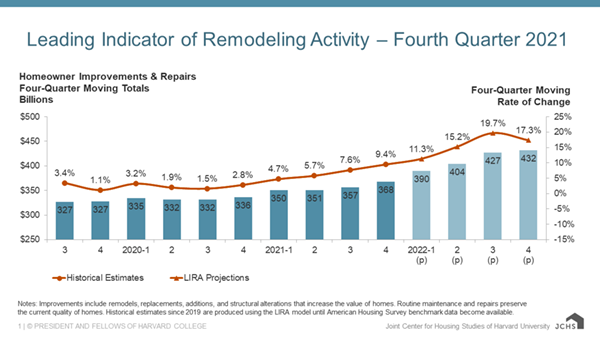CAMBRIDGE, Massachusetts
,
January 20, 2022
(press release)
–
Spending for home improvements and repairs is expected to expand at a stronger pace in 2022, but signs point to some easing of growth by year end, according to the Leading Indicator of Remodeling Activity (LIRA) released today by the Remodeling Futures Program at the Joint Center for Housing Studies of Harvard University. The LIRA projects double-digit gains in annual homeowner renovation and maintenance expenditure will top out in the third quarter of 2022 before beginning a deceleration toward more sustainable rates of growth. “Strong increases in home sales activity, household incomes, and home equity levels are supporting a faster expansion of the home remodeling market over the coming year,” says Carlos Martín, Project Director of the Remodeling Futures Program at the Center. “As owners continue to navigate the ups and downs of the pandemic’s trajectory, the focus on home improvements for changing wants and needs remains in sharp relief.” While annual owner improvement and repair spending could reach $430 billion by the second half of 2022, several headwinds may still temper growth expectations this year,” says Abbe Will, Associate Project Director of the Remodeling Futures Program. “The rising costs of labor and construction materials, difficulty retaining contractors, and climbing interest rates could discourage owners from undertaking new or larger remodeling projects.” The prior two LIRA releases reported spending projections using a smoothing technique to adjust for the immense growth rate volatility in several leading model inputs, which was largely an artifact of year-over-year comparisons to pandemic-induced lows. As these shocks recede further in the past and inputs begin to stabilize, the Remodeling Futures Program is reverting to its standard methods for projecting homeowner improvement and repair spending with this release. The result of this change is somewhat higher growth rate projections than previously reported. The Leading Indicator of Remodeling Activity (LIRA) provides a short-term outlook of national home improvement and repair spending to owner-occupied homes. The indicator, measured as an annual rate-of-change of its components, is designed to project the annual rate of change in spending for the current quarter and subsequent four quarters, and is intended to help identify future turning points in the business cycle of the home improvement and repair industry. Originally developed in 2007, the LIRA was re-benchmarked in April 2016 to a broader market measure based on the biennial American Housing Survey. The LIRA is released by the Remodeling Futures Program at the Joint Center for Housing Studies of Harvard University in the third week after each quarter’s closing. The next LIRA release date is April 21, 2022. The Remodeling Futures Program, initiated by the Joint Center for Housing Studies in 1995, is a comprehensive study of the factors influencing the growth and changing characteristics of housing renovation and repair activity in the United States. The Program seeks to produce a better understanding of the home improvement industry and its relationship to the broader residential construction industry. The Harvard Joint Center for Housing Studies advances understanding of housing issues and informs policy. Through its research, education, and public outreach programs, the Center helps leaders in government, business, and the civic sectors make decisions that effectively address the needs of cities and communities. Through graduate and executive courses, as well as fellowships and internship opportunities, the Center also trains and inspires the next generation of housing leaders. Contact: Kerry Donahue, (617) 495-7640, kerry_donahue@harvard.edu 
* All content is copyrighted by Industry Intelligence, or the original respective author or source. You may not recirculate, redistrubte or publish the analysis and presentation included in the service without Industry Intelligence's prior written consent. Please review our terms of use.




